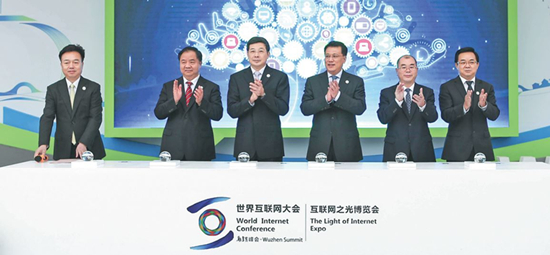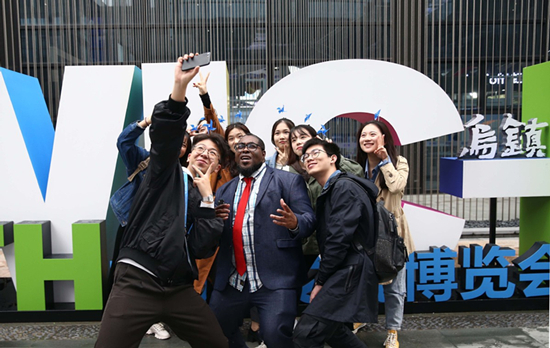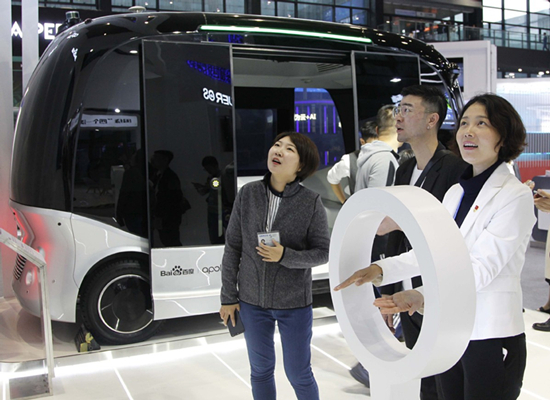Light of Internet Exposition reflects high-tech advances

Zhuang Rongwen (third from left), minister of Cyberspace Administration of China, and Zhejiang Governor Yuan Jiajun (third from right) attend the Light of Internet Exposition on Tuesday in Wuzhen, Zhejiang province. [Photo by Peng Ziyang/China Daily]
Meeting in Wuzhen, Zhejiang province, highlights innovative cutting-edge products, trends changing people's lives
Self-driving vehicles, artificial-intelligence-powered translators, virtual reality goggles, and high-definition video livestreaming enabled by fifth-generation mobile communication technology, are all attracting attention at a smart internet exhibition in Wuzhen, Zhejiang province.
The Light of Internet Exposition kicked off on Tuesday, one day ahead of the much-anticipated the Fifth World Internet Conference.
It demonstrates innovative cutting-edge internet applications and how technological advancements are reshaping people's daily lives and work.
More than 430 enterprises and institutions from 25 countries and regions, including global corporate icons and domestic giants, are showcasing their latest products in the glitzy exhibition center.
"The expo demonstrates the latest technology trends, and pioneering research and development results. It also offers a chance for consumers and industry participants to observe and experience new applications and business models, as well as to promote international exchanges and cooperation," Wu Junqing, a senior official with the Zhejiang provincial government, said at a news conference on Tuesday. The government is one of the co-organizers of the event.
According to Wu, this year's expo is more international than ever, with 81 overseas enterprises and institutions participating. The event has also set up talent matching meetings for the first time, to facilitate exchanges and help companies to recruit new talent.
The expo comes as China is stepping up its push to drive the development of the digital economy.
President Xi Jinping has called for "keenly" grasping the historic opportunity of informatization development in a bid to build the country's strength in cyberspace.
The development of cybersecurity and informatization should contribute to China's drive to develop a modernized economy and achieve high-quality development, and to develop the new model of industrialization, urbanization, and agricultural modernization, Xi said.
Efforts should also be made to develop the digital economy; to promote deep integration between the internet, big data, artificial intelligence, and the real economy; and to make the manufacturing, agriculture, and service sectors more digitalized, smart, and internet-powered, he said.

Students attending the Light of Internet Exposition take a group photograph at the venue of the expo. [Photo by Zou Hong/China Daily]
Already, China has the world's largest internet user base and a dynamic homegrown internet-driven industry. As of June, the country had more than 800 million internet users, more than the entire population of Europe, according to the China Internet Network Information Center, which allocates critical cyber resources such as website domains.
China's internet penetration rate is now at 57.7 percent, and about 788 million netizens access the internet through mobile devices, the center said.
"Internet innovation has been transforming the country's economy over the past several years," said Guo Jintong, chief marketing officer of Yonyou, a major Chinese enterprise software provider, at the news conference for the expo.
The company is demonstrating its cloud service solutions at the event to help drive the country's digital transformation.
"As one of the most impressive results of innovation, the internet is reshaping almost all industries, with ubiquitous networks, connectivity and big data. It will play an even bigger role in the future," Guo said.
His comment was supported by Chinese internet companies' recent great strides in expanding their research and development capabilities, as well as their rise as globally competitive players.
Last year, the country's top 100 internet companies earned 1.72 trillion yuan ($248.7 billion) in revenue, up by 50.6 percent year-on-year. The companies' combined profits in 2017 exceeded 270.7 billion yuan, marking a surge of 82.6 percent year-on-year, according to a report released by the Internet Society of China.
A McKinsey and Co report said internet-enabled technologies and business models will give China's economy a new burst of energy, with their contribution likely to surge from single digits to 22 percent of China's GDP growth by 2025.
At the expo, Alibaba Group Holding Ltd showcased its smart transportation platform, a "brain" that can assist with traffic management by automatically adjusting traffic lights in accordance with queuing vehicles and weather conditions. It can also identify whether people are wearing seat belts or making phone calls while driving.
Other innovative applications at the expo include an AI-enabled computer system that can tell whether users are likely to have eye diseases. It works by scanning users' eyes within seconds and comparing the information against its vast database.

Visitors to the Light of Internet Exposition try Baidu's body sense identification system. [Photo by Chen Zebing/China Daily]
The exhibition is also a prelude to the Fifth World Internet Conference, which will be held from Wednesday to Friday. As part of the country's efforts to boost the digital economy, the conference is themed "Creating a Digital World for Mutual Trust and Collective Governance Toward a Community with a Shared Future in Cyberspace" this year.
A large number of government delegates, international organization representatives, leading internet entrepreneurs and experts from all around the globe have been invited to the expo. They include Turing Award winner Whitfield Diffie and Andrew Ng, founder and CEO of the AI-based online learning platform Deeplearning.ai.
A string of sub-forums are also scheduled, covering a wide range of topics related to AI, 5G, financial technology, cybersecurity, the digital economy as well as the internet and public services.
"The World Internet Conference is a high-tech event that has attracted the attention of people all around the world," said Hocking Xu, CEO of AInnovation, an artificial intelligence startup. The company will join the World Internet Conference's "Big data and artificial intelligence empowering the real economy" topic discussion.
"Big data, born from the internet, is now the driving force behind the development of artificial intelligence. The later stages of the internet era will belong to the AI-empowered industrial internet," Xu said. "We hope to work with our partners in many industries to create an 'AI plus' era and use AI to further the intelligent transformation of the real economy."
The conference will also release the latest versions of two blue books: the World Internet Development Report 2018 and China Internet Development Report 2018. They will include evaluations of internet development in key countries, as well as Chinese provinces and cities, focusing on the latest technologies, applications and development of the sector.

 Print
Print Mail
Mail
 20 Cultural Symbols
20 Cultural Symbols Why Zhejiang
Why Zhejiang Experiencing high-tech products at WIC
Experiencing high-tech products at WIC Zhejiang Release
Zhejiang Release Zhejiang News
Zhejiang News